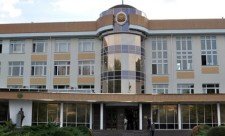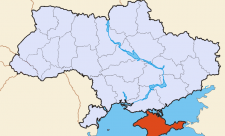Sergey Marchenko
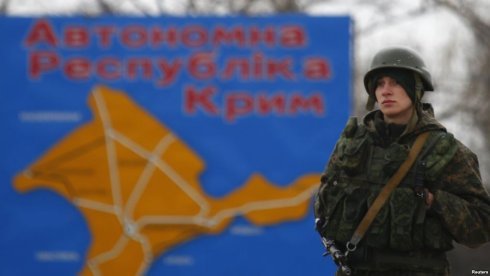 In March, there was the second anniversary of the annexation of Crimea by Russia. These 24 months have dramatically changed the life of the Crimean people: problems with water and electricity took people living on the peninsula back to the cave-dwelling times, integration into the Russian legal field became a serious challenge – queuing to various authorities takes the lion’s share of time of Crimeans. Free Russian medicine in fact proved to be ineffective and the costs of private doctors’ services increased significantly. At the same time, big salaries and pensions existed as long as the Ukrainian prices have been valid on the peninsula. Nevertheless, Russia continues to annex actively the occupied Crimea to its territory. What relations are there between Ukraine and the peninsula?
In March, there was the second anniversary of the annexation of Crimea by Russia. These 24 months have dramatically changed the life of the Crimean people: problems with water and electricity took people living on the peninsula back to the cave-dwelling times, integration into the Russian legal field became a serious challenge – queuing to various authorities takes the lion’s share of time of Crimeans. Free Russian medicine in fact proved to be ineffective and the costs of private doctors’ services increased significantly. At the same time, big salaries and pensions existed as long as the Ukrainian prices have been valid on the peninsula. Nevertheless, Russia continues to annex actively the occupied Crimea to its territory. What relations are there between Ukraine and the peninsula?
Crimean issue in legislation
Ukraine adopted several legal acts regulating relations with the peninsula occupied by Russia for two years of annexation.
The first one was the Law “On guaranteeing the rights and freedoms of citizens and on the legal regime on the temporarily occupied territory of Ukraine” adopted on April 15, 2014 – shortly after the annexation of the peninsula by Russia. According to it, the peninsula’s territory was declared an inalienable part of Ukraine temporally occupied by the Russian Federation. Ukraine refused to recognize occupation authorities of Crimea, their decisions and issued documents.
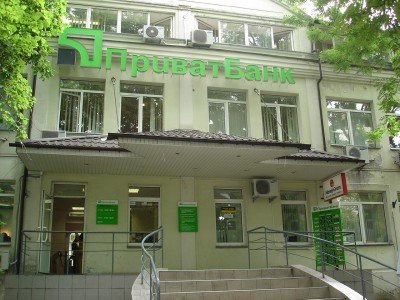 Economic aspects of relations with occupied Crimea were set in the Law “On creation of the free economic zone “Crimea” and special aspects of economic activity in the temporarily occupied territory of Ukraine” dated August 12, 2014. This document granted the citizens of Ukraine with Crimean registration a tax exemption and gave them a non-resident status. This point significantly complicated the already tough life of internally displaced persons, the status of which Crimeans obtained when they left the peninsula. They were denied to open bank accounts, issue salary cards and carry out other operations, which are not entitled to non-citizens of Ukraine.
Economic aspects of relations with occupied Crimea were set in the Law “On creation of the free economic zone “Crimea” and special aspects of economic activity in the temporarily occupied territory of Ukraine” dated August 12, 2014. This document granted the citizens of Ukraine with Crimean registration a tax exemption and gave them a non-resident status. This point significantly complicated the already tough life of internally displaced persons, the status of which Crimeans obtained when they left the peninsula. They were denied to open bank accounts, issue salary cards and carry out other operations, which are not entitled to non-citizens of Ukraine.
Goods delivery to Crimea has been carried out on the basis of customs procedures through the appropriate checkpoints. According to the law, the goods produced in Crimea can be exported to other countries only if they have the Ukrainian certificate of conformity.
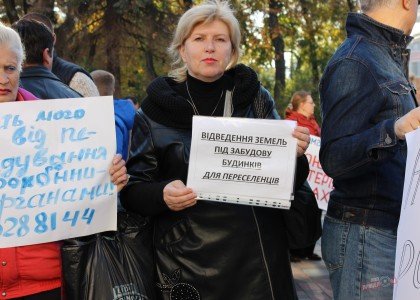
The meeting of IDPs, Kiev, 2014
The Law “On ensuring the rights and freedoms of internally displaced persons” adopted on October 20, 2014 was intended to protect the rights of Crimean displaced persons. According to it, Ukraine is obliged to use all possible measures to respect a scope of rights of internal refugees (by law, they are called internally displaced persons or IDPs – editor’s note), including the rights to education, pensions and social security services. In order to ensure exercising rights of IDPS, a special mechanism for their registration on the territory controlled by Ukraine was introduced.
The adoption of certain amendments to existing laws of Ukraine in 2016 made the procedure of obtaining Ukrainian documents such as birth and death certificates easier for Crimeans. The Law guaranteed quotas for applying to higher educational institutions and certification procedures for those who have already obtained diplomas of higher education on the territories not controlled by Ukraine.
System of cooperation with occupied territories
Almost from the first days of the occupation of Crimea, the Ukrainian side has placed the checkpoints at road entrances to Crimea in response to the actions of self-proclaimed authorities of the peninsula. Ukrainian border guards began to check documents in trains that have run to the peninsula at that time. Later, temporary checkpoints started to operate on a permanent basis and Crimea became estranged from the mainland Ukraine more than ever.
“Polite People” at the Simferopol airport, February, 2014
On December 27, 2014, “Ukrzaliznytsya” suspended railway communication with the peninsula. Air communication between the mainland and Crimea was stopped in February when “men in green” have occupied Crimean airports. In December 2014, the bus transportation to Crimea was stopped as well.
When the Law on occupied territories was adopted, customs procedures started to be used for the goods imported from Crimea: limits on the currency, alcohol and drugs import to the mainland were imposed.
It’s been a long time coming when the Cabinet of Ministers of Ukraine adopted “The procedure for entry to the temporarily occupied territory of Ukraine and exit from it” in June 2015. According to this document, the entry to the temporarily occupied territory of the Crimean peninsula is organized through the entry and exit control checkpoints “Chongar”, “Kalanchak” and “Chaplynka”. Citizens of Ukraine may enter or leave the peninsula freely on the basis of Ukrainian identity cards (regular, foreign, official or diplomatic passport, seafarer’s or crew members’ identity cards and others). As for children up to 16 years, they need to have a notarized parental permit for child’s visit in addition to a travel document (foreign passport). In fact, there is a mechanism of crossing the state board used.
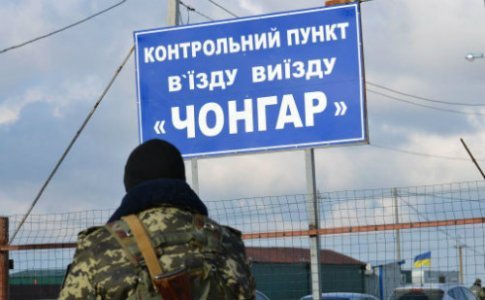
Тhe administrative border with Crimea
Hard permit regime was also introduced for foreigners, who can visit the occupied peninsula only having a special permit issued by the State Migration Service. Later, the entry procedure for foreign journalists and representatives of public organizations was simplified to some extent, but it still emains very complicated. Violation of this “Procedure” and visits, for example, through Moscow invoke the criminal proceedings in Ukraine. Some European politicians have already received a ban from the State Security Service of Ukraine on entry to the country due to ignoring the Ukrainian rules of visiting the temporarily occupied territories.
In connection with the civil blockade of the peninsula, the Cabinet of Ministers of Ukraine adopted the Resolution #1035 that completely stopped the trade with the occupied peninsula in December 2015. In particular, it is allowed to import and export to/from Crimea not more than 50 kg of socially important products (bread, macaroni, cereals, dairy products, meat and cured pork fat) with a total value of up to 10 000 hryvnas. This is with the exception of strategic goods (as agreed by the Ministry of Economic Development and Trade of Ukraine) and humanitarian aid.
(To be continued)






